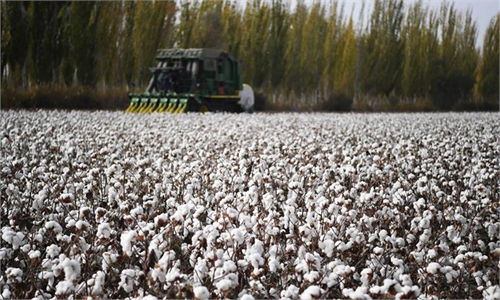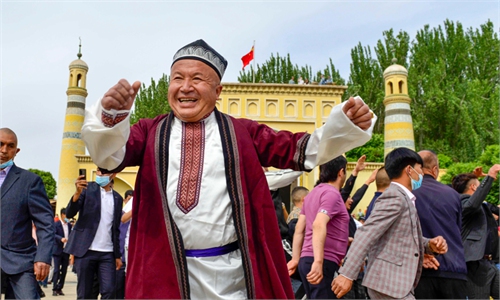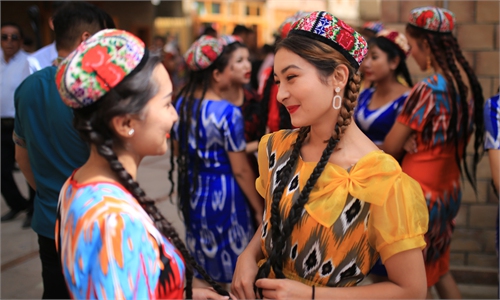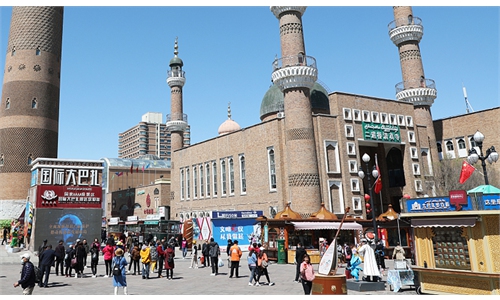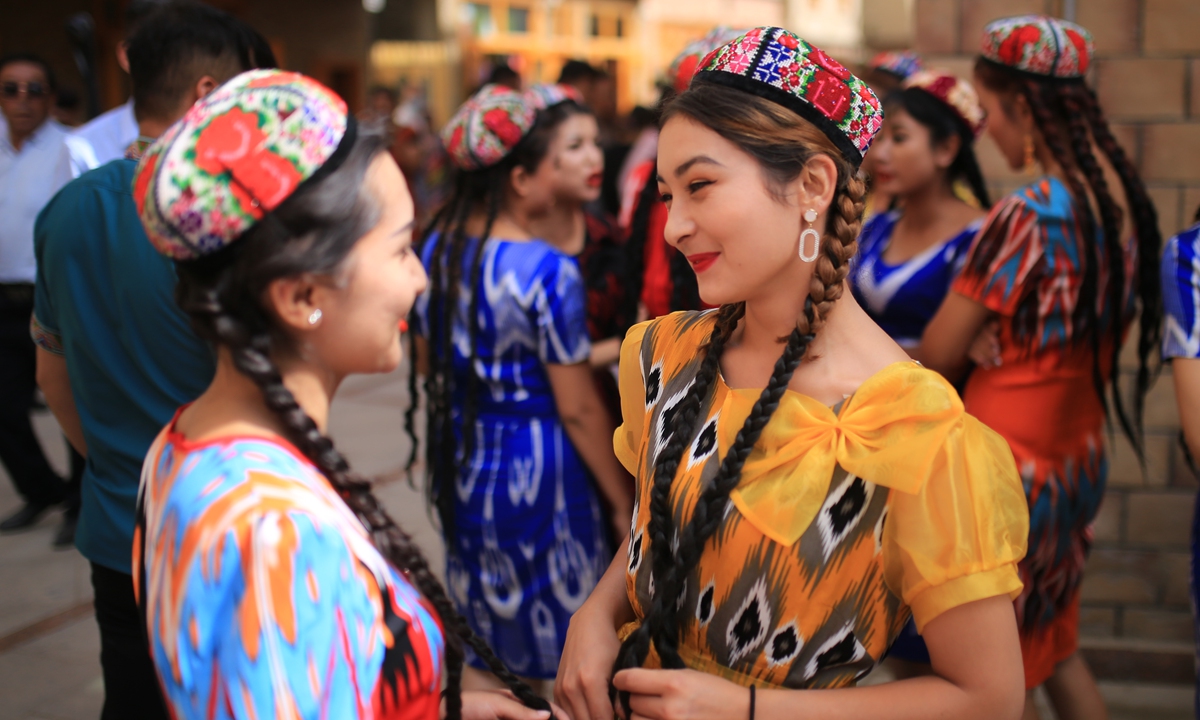
Women in traditional garb chat in Tuancheng during a break from a group dance during the Corban Festival in Hotan. Photo: Liu Xin, Fan Lingzhi/GT
Dear Sir Geoffrey Nice,I'm writing to share my views on the failure of the "Uyghur Tribunal." Don't get upset because you failed to make it a human rights or political blast. It is totally in line with the anticipation, since the global audience has kept its eyes wide open, and it has been increasingly hard for rumors to spread beyond Fleet Street nowadays.
It's simply tiresome for you and your crew to manage to spend days and nights drafting a "judgment" out of nowhere. I really mean it because it reads more like an Alfred Hitchcock thriller than a serious legal document or academic work. The so-called tribunal, by nature and as your team has suggested, is not a judicial body, and the "verdict" obviously is not a legally binding "judgment."
However, you, as a seasoned lawyer, and your team never hesitated to intentionally mislead the public by creating an atmosphere that the "tribunal" is relevant to the law and then tried to gain credibility for your "judgment," which is somehow "improvised" on the basis of speculations other than facts, political manipulation rather than academic independence and, more importantly, the abuse of the rule of law.
The evidences in the "judgment," if any, are seriously flawed and ungrounded. For instance, you mentioned in the "judgment" that "one young woman of 20 or 21 was gang raped by policemen in front of an audience of 100 people all forced to watch." The statement came from a BBC interview, in which Sayragul Sauytbay, one of your "witnesses," described the horrific rape fiction. However, even if we put the lack of evidences aside, we can notice that separately in her interview with the Globe and Mail, she claimed that "she did not personally see violence." Also in the BBC interview, she said that "there was no meat" for the so-called "prisoners." But when interviewed by Deutsche Welle, she made a contradictory statement that "Muslims are forced to eat pork." I wonder if it is either amnesia or the different plots given by different directors that made the actress change her mind?
It also makes sense, since the sponsor behind the "Uyghur Tribunal" is the separatist group of World Uyghur Congress (WUC), which is supported by the National Endowment of Democracy of the United States. Lavishly spending the American taxpayers' dollars surely does not constitute extravagance, as it is almost a daily practice for American politicians.
However, it is still quite shocking for you to beautify the terrorist attacks conducted by or under the guidance of WUC against the Uygurs, and, more prominently, to argue that the East Turkistan Islamic Movement has been "effectively dismantled" to make the extremists look more innocent. Did you learn that from Mike Pompeo, who removed the UN-listed terrorist group from America's list in 2020? Is that what the initial 235,000 pounds from the WUC asked for?
I sincerely ask to differ on the academic integrity of the sources you used. In particular, I was shocked to find that Adrian Zenz, a far-right evangelical ideologue who was self-claimed to be "led by God" against China, was involved, since he was basically in every similar research. Adrian Zenz has been accustomed to using "possible," "I heard" and all types of unverified sources in his "studies" while fabricating evidences to corroborate his claim.
Some of your sources were clearly unaware what academic independence is all about. For instance, you cited for four times in the "judgment" the report of the Newlines Institute for Strategy and Policy, whose stated aim is "to shape U.S. foreign policy based on a deep understanding of regional geopolitics and the value systems of those regions." The founder of the institute, Ahmed Alwani, served as a member of the advisory board of the US military's Africa Command, which further proved the institute's academic reliance on a certain country.
Australian Strategic Policy Institute, one of your major information and "expert witness" sources, released its annual report lately. The organization revealed to the public that over 80 percent of its funding are from Western governments and defense industries. The US State Department had offered the organization a A$985,000 funding to report on "various projects, including Xinjiang human rights, China tech and systems of influence projects" and, separately, a A$592,000 funding to report on "various projects, including talent recruitment, disinformation and social media, China tech projects." Isn't relying totally on these American-sponsored sources a Western monopoly on the right to speak?
As I am about to stop here and have some tea, I happen to find my cup placed upon a selected piece of the renowned philosopher Bertrand Russell commenting on Friedrich Hegel, which I suppose is somehow similar to the situation we have here.
"Hegel knew nothing about China except that it was," Russell said.
And you, dear Sir, know nothing about Xinjiang except that it is.
Regards,
Xin Ping
The author is a commentator on international affairs, writing regularly for Global Times, China Daily etc. He can be reached at xinping604@gmail.com.
